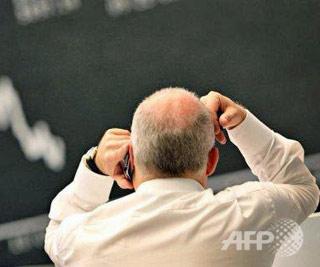European markets await more turbulence in 2012
European stocks and the euro will face fresh turbulence in 2012 after a year in which equity markets slumped and the single currency lost ground against the dollar mainly due to the eurozone crisis.
Europe's main stock markets
have tumbled between 6.5 and 25 percent since the start of 2011, as traders
looked past positive economic data and earnings, while the euro has fallen 2.5
percent versus the dollar in volatile trading.  File picture of a stock
trader. (AFP/File/Daniel Roland)
File picture of a stock
trader. (AFP/File/Daniel Roland)
Yields on eurozone sovereign debt meanwhile rocketed in late 2011 as investors demanded top returns for lending money to the bloc's indebted countries such as Greece and Italy.
"Attempting to forecast where the dollar, euro, gold, oil or any western stock market might end next year is no less a mugs game than it was this time last year," said Howard Wheeldon, a senior strategist at BGC Partners.
"Who could have imagined that by the eleventh month of the year we would have been talking about not only the collapse of the eurozone but also a possible breakdown of the European Union?
"Who would have thought that in such a short space of time the economies of Europe would have effectively ground to a halt and that the outlook for resumption of growth would be virtually non-existent?" he questioned.
The eurozone debt crisis dominated market sentiment in 2011 and is widely expected to be the main focus in 2012, at least in the early part of the year, overshadowing geopolitical strains and the race for the White House.
The euro ended the year by briefly diving under $1.30 and hitting the lowest point since the start of 2011. By Friday, it had recovered slightly to trade at $1.3076.
The single currency meanwhile plunged to a 10-year low point against the yen in September as investors reacted to mounting economic uncertainty and tumbling equities in Europe and the United States.
"2012 is likely to be dominated by the quest for safe havens on the foreign exchange markets, as risks are omnipresent," said Commerzbank analyst Ulrich Leuchtmann.
"The eurozone debt crisis is threatening to escalate or at least to become a permanent institution connected to a high level of anxiety. Globally economies are either sliding into recession or have to expect falling growth levels.
"In view of all these dangers the US dollar might turn out to be the real winner," he added. Other traditional safe havens include the yen and gold.
Although the euro is set to end the year lower against the greenback, at the start of May it struck a 16-month high of $1.4940 owing to weak US economic data and as investors welcomed a bailout of indebted eurozone member Portugal.
In recent months the euro and European stock markets have headed south as countries struggle to get to grips with the escalating debt crisis.
"For 2012, the eurozone crisis is likely to remain a key issue," said Neil MacKinnon, an economist at Russian financial group VTB Capital.
"Greece is likely to default and other countries, including Italy, would require debt restructuring."
Among Europe's main stock markets, Milan has been the biggest faller in 2011, losing 25 percent since the start of the year, as investors worried about a possible bailout of Italy, the eurozone's third biggest economy.
London's benchmark FTSE 100 index has shed 6.5 percent to around 5,500 points, with non-eurozone member Britain shielded to an extent from the bloc's crisis, even though the bloc remains its main trading partner.
Frankfurt has slumped 15 percent, Paris 18 percent and Madrid 13 percent.
"Rather than providing a FTSE 100 prediction for end-2012, we are recommending the 'bottom-up' approach for investors," said Richard Hunter, head of equities at Hargreaves Lansdown stockbrokers.
"There remains ongoing uncertainty around the eurozone situation. The likelihood of a peripheral country stepping outside of the euro increases as the situation wears on. On the economic front, the possibility of a recession in the area seems more likely than less to happen."
- AFP/de
 Japan to help ASEAN keep closer watch on greenhouse gas emissions
Japan to help ASEAN keep closer watch on greenhouse gas emissions
 Thai transport ministry launches 2.68 trillion THB infrastructure project
Thai transport ministry launches 2.68 trillion THB infrastructure project
 New Japanese Prime Minister with the mission to restore trust
New Japanese Prime Minister with the mission to restore trust
 ASEAN+3 to grow at 4.2% in 2024: research office
ASEAN+3 to grow at 4.2% in 2024: research office
 Thai PM outlines vision for regional cooperation at ACD forum
Thai PM outlines vision for regional cooperation at ACD forum
 Vietnam - a prime example of effective cooperation with UNESCO: Official
Vietnam - a prime example of effective cooperation with UNESCO: Official
 Strong earthquakes strike Philippines, Tonga
Strong earthquakes strike Philippines, Tonga
 Thailand school bus fire: Death toll rises to 25
Thailand school bus fire: Death toll rises to 25
 Philippines’ first EV battery factory inaugurated
Philippines’ first EV battery factory inaugurated
 World Peace Council lauds Vietnam’s human rights policy
World Peace Council lauds Vietnam’s human rights policy




